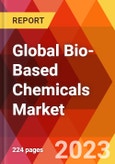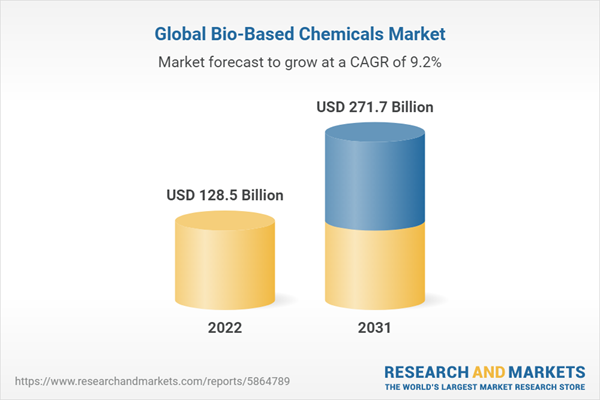The global bio-based chemicals market held a market value of US$ 128.5 Billion in 2022 and is estimated to reach US$ 271.7 Billion by the year 2031. The market is anticipated to register a CAGR of 9.2% during the forecast period. The market volume in 2022 amounted to 81,062.2 thousand units and is expected to reach 131,710.9 thousand units by 2031, with the growth rate of 5.9% over the forecast period.The global bio-based chemicals market held a market value of US$ 128.5 Billion in 2022 and is estimated to reach US$ 271.7 Billion by the year 2031
Many governments around the world are implementing policies and incentives to support the development of the bio-based chemicals industry. This includes funding for research and development, tax incentives, and mandates for the use of renewable feedstocks. Advances in technology are making it easier and more cost-effective to produce bio-based chemicals. This includes improvements in biotechnology, enzymatic processes, and fermentation technologies. Bio-based chemicals offer an alternative to traditional petrochemicals, which are derived from fossil fuels. As concerns about climate change and energy security continue to grow, the demand for bio-based chemicals is likely to increase.
The production of bio-based chemicals can be more expensive than traditional petrochemicals, due to factors such as the cost of feedstocks and the complexity of production processes. The availability of renewable feedstocks such as biomass and waste materials is limited, which can limit the growth of the bio-based chemicals industry.
Growth Influencers:
Increasing Consumer Adoption of Bio Based ProductsThe increasing consumer adoption of bio-based products is a significant driver for the bio-based chemicals market. Consumers are becoming more environmentally conscious and are seeking out products that are more sustainable and have a lower environmental impact. Bio-based products are seen as a more sustainable alternative to traditional, petrochemical-based products, which are non-renewable and have a higher carbon footprint. Bio-based chemicals are now being developed with improved performance characteristics, which is increasing consumer adoption. For example, bio-based plastics are being developed that are more durable and have better heat resistance than traditional plastics.
Environmentally friendly properties and favorable government policy
Bio-based chemicals are derived from renewable sources and have a lower carbon footprint than traditional, petrochemical-based chemicals. As concerns about climate change and environmental impact continue to grow, there is a growing demand for environmentally friendly products. This is creating a favorable market environment for bio-based chemicals. Moreover, governments are encouraging the use of bio-based products through various policies and incentives, such as tax incentives and mandates for the use of renewable feedstocks. This is helping to create a favorable environment for the adoption of bio-based products.
Segments Overview:
The global bio-based chemicals market is segmented into type and application.By Type
- Bio-Lubricants
- Bio-Solvents
- Tetrahydrofuran
- Cyclopentanone
- Tetrahydropyran
- Others
- Bioplastics
- Biodegradable Bioplastics
- Non-Biodegradable Bioplastics
- Bio-Alcohols
- 1,3-propanediol
- 1,6-hexanediol
- 1,10-decanediol
- Bio-Surfactants
- Bio-Based Acids
- Succinic acid
- Furfural
- Butadiene
- 1-4 BDO
- Others
- Others
By Application
- Automotive
- Personal Care
- Food & Beverages
- Agriculture
- Industrial
- Pharmaceuticals
- Packaging
- Others
Regional Overview
By region, the global bio-based chemicals market is divided into North America, Asia Pacific, Europe, and rest of the world. The North American market for bio-based chemicals is divided into the US, Canada, and Mexico.
Moreover, the European bio-based chemicals market is segmented into the UK, Germany, France, Italy, Spain, Poland, Russia, and rest of Europe. The European market for bio-based chemicals held the largest market share of more than 35% in 2022. The Asia-Pacific market for bio-based chemicals is divided into China, India, Japan, Australia and New Zealand, South Korea, ASEAN, and rest of Asia Pacific. The Asia Pacific market is supposed to be the fastest growing with a CAGR of more than 11.4% over the anticipated period. Furthermore, the rest of the world region is divided into GCC, South Africa, Brazil, Argentina, and rest of Middle East and South Africa.
Competitive Landscape
Key players operating in the global bio-based chemicals market include Archer Daniels Midland Company, Cargill Incorporated, Dow Chemicals, Toray Industries Inc, AGAE Technologies, TotalEnergies, DuPont, Evonik Industries, GF Biochemicals Ltd, Mitsubishi Chemical Corporation, DSM, and others. The cumulative market share of top four players is around 28.1%. Toray Industries, Inc. created the first 100% bio-based adipic acid (a component of nylon 66 (polyamide 66) in the world in August 2022 using sugars obtained from non-edible biomass. The company's microbial fermentation technology and chemical purification technology, which makes use of separation membranes, were combined in a unique synthesis method to accomplish this success.
The global bio-based chemicals market report provides insights on the below pointers:
- Market Penetration: Provides comprehensive information on the market offered by the prominent players
- Market Development: The report offers detailed information about lucrative emerging markets and analyzes penetration across mature segments of the markets
- Market Diversification: Provides in-depth information about untapped geographies, recent developments, and investments
- Competitive Landscape Assessment: Mergers & acquisitions, certifications, product launches in the global bio-based chemicals market have been provided in this research report. In addition, the report also emphasizes the SWOT analysis of the leading players.
- Product Development & Innovation: The report provides intelligent insights on future technologies, R&D activities, and breakthrough product developments
- Pricing Analysis: Pricing analysis of various components used in the manufacturing
- Manufacturing Cost Analysis: Cost-share of various components in bio-based chemicals, cost analysis of bio-based chemicals, unit cost analysis of bio-based chemicals
- Overview of the Chemical Industry
- Recent Trends in Integrated Biorefineries Development for Sustainable Production
The global bio-based chemicals market report answers questions such as:
- What is the market size and forecast of the global bio-based chemicals market?
- What are the inhibiting factors and impact of COVID-19 on the global bio-based chemicals market during the assessment period?
- Which are the products/segments/applications/areas to invest in over the assessment period in the global bio-based chemicals market?
- What is the competitive strategic window for opportunities in the global bio-based chemicals market?
- What are the technology trends and regulatory frameworks in the global bio-based chemicals market?
- What is the market share of the leading players in the global bio-based chemicals market?
- What modes and strategic moves are considered favorable for entering the global bio-based chemicals market?
Table of Contents
Companies Mentioned (Partial List)
A selection of companies mentioned in this report includes, but is not limited to:
- AGAE Technologies
- Archer Daniels Midland Company
- BASF SE
- Braskem SA
- Cargill Incorporated
- Koninklijke DSM N.V.
- Dow Chemicals
- DuPont
- Evonik Industries
- GFBiochemicals Ltd
- IP Group PLC
- Lyondellbasell
- Mitsubishi Chemical Corporation
- Toray Industries Inc
- TotalEnergies
- Vertec BioSolvents
Table Information
| Report Attribute | Details |
|---|---|
| No. of Pages | 224 |
| Published | July 2023 |
| Forecast Period | 2022 - 2031 |
| Estimated Market Value ( USD | $ 128.5 Billion |
| Forecasted Market Value ( USD | $ 271.7 Billion |
| Compound Annual Growth Rate | 9.2% |
| Regions Covered | Global |









